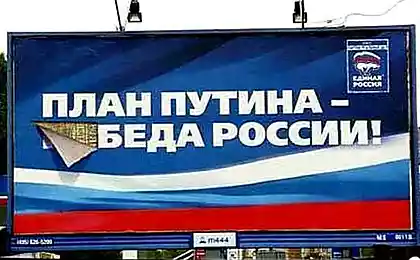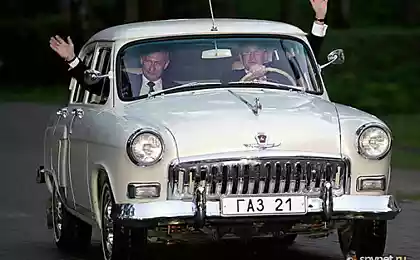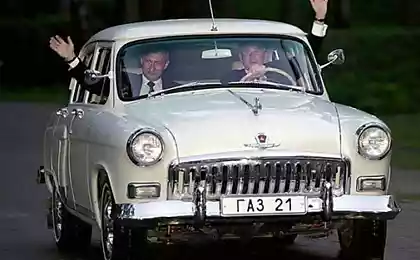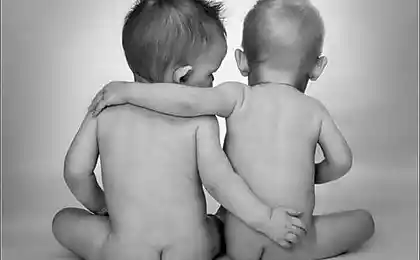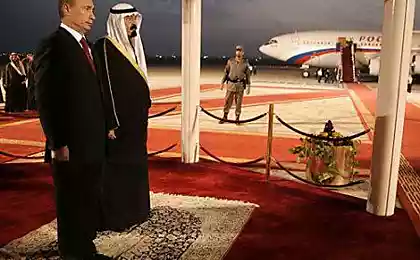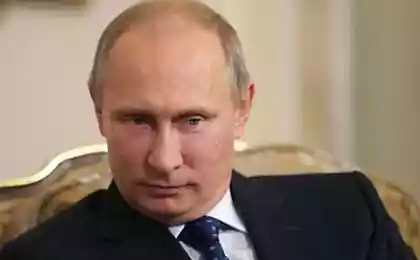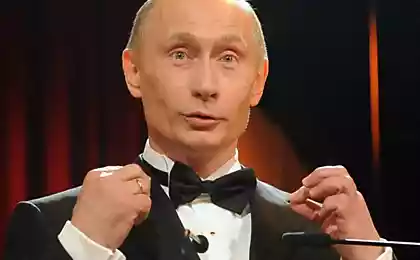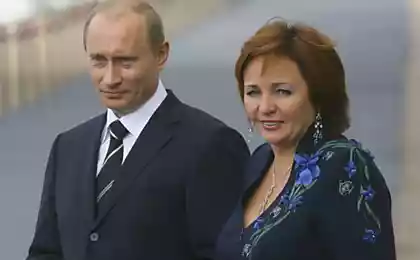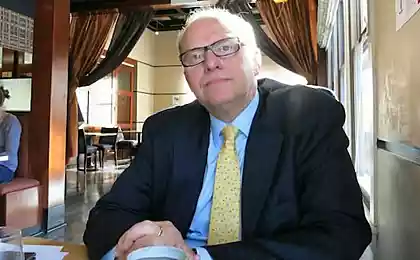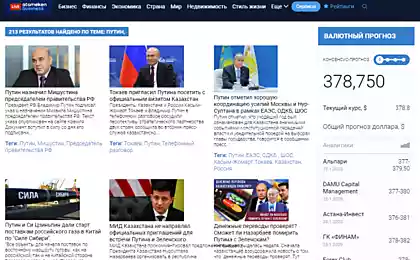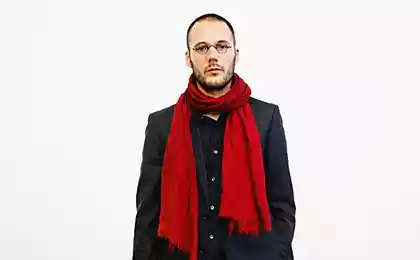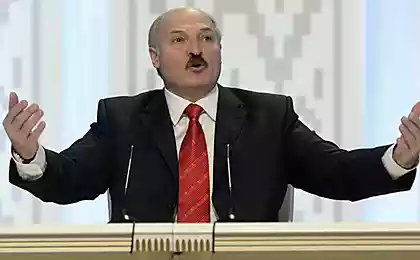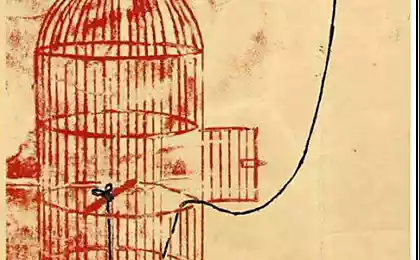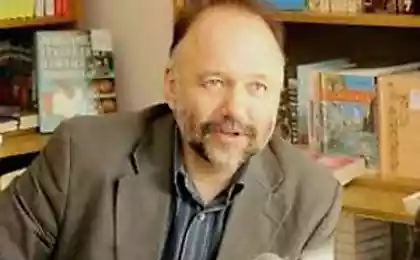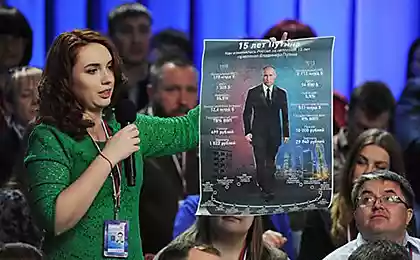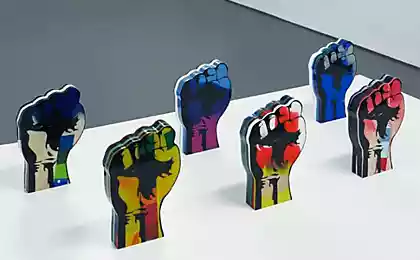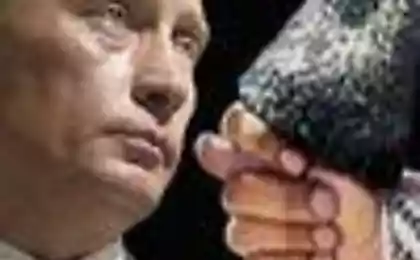1726
Revelation former adviser to Putin. "Putin will die at the head of Russia"
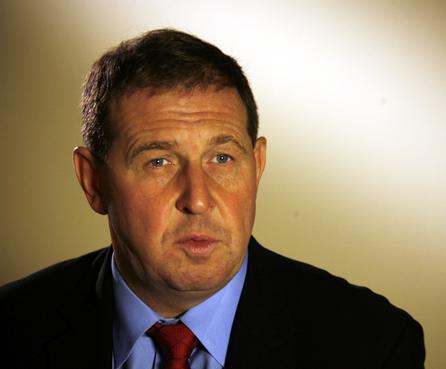
Russian expert Andrei Illarionov, an adviser to Vladimir Putin from 2000 to 2005, at the time caused a stir his leaving office.
"... He said he could no longer freely express their opinions, and in Russia six years of Putin's presidency was a change of political regime. "It is one thing - to work in a partly free country, which Russia was six years ago, and another thing - when the country ceased to be politically free," - said Illarionov. " So Google the story of his resignation, which occurred in late December 2005.
Illarionov was not just an adviser to Putin, and Russian "sherpa" at the meetings of the "Big Eight". That's it for four and a half years on behalf of the Kremlin was involved in preparing the summit of the highest-ranking in the world.
Today Illarionov settled in Washington as a senior researcher at the Institute of Cato, to uphold the principles of liberalism on the planet.
During a conversation with the "Ukrainian Truth" Illarionov makes two retreats: "I try not to comment on the personal qualities of the people with whom he worked. And not to disclose information which has become known to me in my work ».
However, as can be seen from the interview itself, it departs from these rules - sound and personal assessment, and information pops up that can not be obtained from other sources, unless you witnessed the events. As an example, the conversation Putin and Kuchma in the midst of the "Orange Revolution» ...
- Mr. Illarionov, in your opinion, what is driving Putin in relations with Ukraine?
- The ratio of the Russian government in Ukraine is based on the notion, which Putin said a few years ago. Outwardly, it looked like a slip of the tongue, but in reality, of course, it was a conscious act. He said that Ukraine does not have the long history of their own state, and a significant part of Ukrainian territory is actually a Russian territory, which fell to Ukraine unreasonably. "Half of Ukraine - Russia", something like that ...
Partly it recognized the independence of the state of Ukraine, but the inner feeling of great injustice, coupled with the fact that at least part of the territory of Ukraine would have to belong to Russia, invisibly present.
And if you can not take revenge political way, advancing economic activities.
- How much space is occupied by Ukraine to build their vision of the world Putin?
- The phrase, which Vladimir Putin repeated after Yegor Gaidar, reflecting an imperialist vision of the Russian elite "greatest geopolitical catastrophe of the twentieth century - is the collapse of the Soviet Union».
Therefore, the ratio of both this event and to those States that were formed in the territory of the former USSR, is appropriate. It is an instinctive, almost unconscious desire to rebuild, to reconstruct the Soviet Union.
At the same time it does not mean the desire to restore the Soviet Union in the form in which it was as of 1991. These people are well aware that this is no longer possible. But what kind of new Soviet Union they want, still do not fully know. They want to restore the effect of controlling the center - and use this to influence their existence.
In their vision of the world is made up of various units - explicit or implicit. The Soviet Union in this case was a clear unit.
- In "their" vision of the world - is the FSB?
- I would say that people who take most of the political decision-making in Moscow today. They say: "Look who's on the map of the world today?". Is the United States. And there are a number of other countries, whose leadership wishes to perform, instructions, orders, installation Washington. Is the European Union. There is a group of EU Member States, and a group of other countries, which tend to the European Union and who perform errands Brussels. Brussels itself to some degree is under the influence of Washington. There is China, and someone should be in the wake of China. However, we must pay tribute to Putin at the beginning of the presidency, he sincerely wanted an alliance with the West.
- This was when you worked as an advisor of Putin?
- Yes. But I must say that it was not due to the fact that I worked there. It was a personal conviction of Putin - that Russia is a safe, comfortable position - this position in the Western alliance. Putin has repeatedly said he wants to see Russia as a member of NATO. And it did not just privately, but publicly.
- Wait, is this was said publicly?
- Of course. During the one and a half years, this was the official position. As for the EU membership, these conversations were, but not in public, as in the negotiations with European leaders.
But the fact is that quite quickly it became clear that the requirements of the European Union is too complicated for modern Russia. And for the foreseeable future membership in the European Union does not threaten Russia. In addition, the European Union rather abruptly said that Russia does not see as a candidate for the EU, because Russia is too huge bear who just radically change the balance of power in the EU, with their weight simply fall apart.
Therefore, the desire to integrate into Western structures, primarily through NATO, was public and repeated. And, besides, it seemed much more realistic than the European Union. Putin was the first person to call Bush after September 11. He has had very serious in providing intelligence, secret service cooperation, cooperation on Afghanistan. However, the American administration in the person of the same Bush said that Russia does not threaten NATO membership.
It was a painful blow for Putin. The next step was, of course, the campaign to prepare the intervention in Afghanistan, and then Iraq. Afghanistan was completely supported by Putin - the occupation by US forces to solve a lot of problems for Russia in Central Asia.
It is quite another - Iraq. He was perceived as a Soviet sphere of influence, which is inherited by Russia. Therefore, the US invasion of Iraq was perceived in the minds of a violation of property rights, "the US invasion in our garden».
Putin made a temporary alliance with Schroeder and Chirac. And in spring 2003 was the turning point in this sense. Although the reaction of Americans toward Russia, and Putin has been extremely restrained. It was the famous phrase of State Condoleezza Rice: "punish France, ignore Germany and Russia to continue the relationship, as if nothing had happened».
- This has been a real terms?
- Yes. This is a real guide to conduct US foreign policy. And there was a famous case where a summit in Evian, France, in June 2003, Bush went to the half, without waiting for the end. The case is absolutely unprecedented in the history of semerochnyh-vosmerochnyh summits. Since Germany had some cooled, and relations with Russia continued. In general, a half years between September 2001 and March 2003 - it was the honeymoon between the Russian and the American administration.
«orange revolution» Serious shocked PUTIN
- What was the "orange revolution" for Putin?
- I mean, what kind of things have led to a radical reversal in the mind, the outlook of Vladimir Putin in the international arena. The first - is the refusal of Russia's accession to the EU. The second - the refusal of NATO to Russia's accession. Third - tough spat over Iraq. And then we went to the Georgian "rose revolution" and the "orange revolution" in Ukraine. Both of these events were taken by Putin in the West as an action to undermine Russia.
- That is, he still believes that it was the technology?
- Yes, of course ...
- What do you think?
- ... Especially because some of the representatives of Western countries frankly, they help to do it. For example, Michael McFaul (Stanford professor, the current US ambassador in Moscow) told how he helped with the financing of the opposition in Ukraine. He said: "Yes, indeed, we have helped, but it's funny money, it's a bit compared to the money that gave Russia».
- If memory serves, the McFaul nevertheless said that the US supported the institutions of civil society in Ukraine, not the opposition.
- Yes, of course, "civil society." But in this particular case, this means support for the "orange revolution».
If the "orange revolution" has passed by itself, maybe it would not create such an impression on Putin. But this was preceded by a lot of other events. And, secondly, Russia and Putin quite seriously invested in Yanukovych in 2004. It directed a huge number of Russian experts, political scientists, a lot of money spent. Putin himself has repeatedly flew to Ukraine Medvedchuk constantly consulted with Medvedev.
Therefore, the "Orange Revolution" seriously shocked Putin. Moreover, at a key moment after the first round of the "orange revolution" Kuchma flew to Moscow for talks with Putin. The meeting was at the airport, half an hour there they talked - and everything. And when Putin urged Kuchma to use force against the "orange revolution", and Kuchma, stubbornly staring at the ceiling and seeing the laces on his shoes, constantly repeated: "Vladimir Vladimirovich, you do not understand - Ukraine became the other." "Wait, and we all agreed! ...". And Kuchma said: "Ukraine has become another". As a result, Kuchma did not consent to the use of force.
- But he suggested that Yanukovych give such an order on their own, as we know in Ukraine.
- At that moment, the real political powers were Kuchma. And Kuchma made a choice that he could stay and live in Ukraine, and not on any dacha outside Moscow. This produced a final powerful psychological blow to Putin, who has changed his attitude to Ukraine and the West, and to the world.
- Do you understand what role Medvedchuk in all these events?
- As far as we can understand, Medvedchuk, Kuchma was a confidant, and Medvedev was Putin's confidant. And if it were possible, all the main talks on Ukrainian project were just Medvedev with Medvedchuk.
- From the point of view of you as a scientist than was the "orange revolution" and what your assessment of this phenomenon?
- There's just there are different levels. One level - just election fraud. Another - a reflection of a real split in Ukraine between East and West. It's just a different political group. And in that moment, in 2004, narrowly won the West over the East. Five years later, the East took revenge.
- But you are a researcher to evaluate the "orange revolution»?
- For the historian of important facts, then the interpretation is dependent on the political goal of moral criteria. What can I say? I do not live in Ukraine. In my opinion, it's an interesting thing, good, useful.
- It was a mistake because Putin unconditionally put Yanukovich and Yushchenko insure risks through?
- See, this is politics. For example, now Putin puts on Assad. For two years the whole world says that Assad - a tyrant, a despot, a murderer, a man who poisoned gases thousands of their fellow citizens. And that it changed the position of Putin? No.
Incidentally, in the case of Yanukovich it proved that when Yanukovych lost, then, Putin was able to create and develop a vigorous relationship with Ms. Tymoshenko.
Putin will not forgive Saakashvili RESISTANCE
- Georgian war - it was a big mistake of Saakashvili and Putin?
- Saakashvili did not make any mistakes.
The active phase of the war began to Vladimir Putin and Dmitry Medvedev, ordered the invasion of Russian troops in Georgia, August 4, 2008, 3 days before, when Saakashvili made a step back. The invasion of Russian troops started early in the morning on August 5, August 6, advance units entered the territory of Georgia, and August 7, they began fighting there. A cutting-edge Special Forces troops were abandoned a month before, and that Russian special forces troops have played a key role in the provocation entitled "Kill the Russian peacekeepers in Tskhinvali».
- As the meaning of Putin was to unleash the war in Georgia?
- The task was to recognize the independence of Abkhazia and South Ossetia. He did not hide it in public, he did not hide it in conversation with Saakashvili, and said: "In general, do not worry. West recognizes the independence of Kosovo, and I recognize the independence of Abkhazia and South Ossetia. It is not your problem. It's great uncle in general conversation - us and the Americans. Will you be my friend - it means that something can get, you will not be friends - get nothing ».
Saakashvili did what he can not forgive neither Putin nor Medvedev: he began to resist. It turned out to be very effective, very energetic, and from a military point of view, and in terms of the deployment of the international campaign. And so, although Putin got what he wanted to get, but he got it a much higher price than he had expected.
Moreover, the most important thing - Saakashvili was able to almost completely withdraw the population of the Georgian enclave north of Tskhinvali. He saved the lives of a total of 20 thousand residents of the Georgian villages. In terms of the military, the operation proved to be a lose-lose for Georgia, but from the standpoint of the political - a brilliant operation. She made clear to the world that previously could not be explained by Saakashvili - Abkhazia and South Ossetia occupied by Russian troops.
- Why did the Georgians do not forgive Saakashvili?
- It depends on the level of education, the level of understanding of the level of ambition. Many people simply do not understand, say, "You lost territory." And you were the territory? And then, you're fighting with someone? Russia and Georgia can fight on equal terms? This is ridiculous!
- You are friends with Saakashvili?
- With the head of state can not be friends. With no one. You can not be friends with Putin, it is impossible to be friends with Saakashvili, it is impossible to be friends with Bush. If you are not familiar to them from childhood. In adulthood such friendships do not happen.
- What do you call your relationship with him?
- I must say that Saakashvili - a unique leader of the former Soviet Union, who was able to do so much in such a short period of time.
- Why Yushchenko could not?
- Speaking analytically, there are several building blocks of success. First - it is their own vision of the present and the future of the country. Secondly, a proprietary nature. Third - is the presence of teams and team building. Fourth - a permanent job with it all.
DIE Putin at the helm RUSSIA
- What is best for the post-Soviet countries - parliamentary or presidential republic?
- I was doing as an economist rather serious research about the conditions in which political institutions which will ensure a higher rate of economic growth. He compares the presidential form of government with a parliamentary. So, a parliamentary form of government in the post-war, post-World War II years of economic growth provides about twice higher than the presidential form of government.
- What is the future of Putin?
- Personal or political?
- And then, and then. It will elect a fourth term?
- He will die at the head of Russia. We do not know that it will happen from natural causes or violent, but for me it does not make any doubt that he will part with this post only because of the physical death.
- That is, if he is in good shape, it will go to the sixth, seventh period?
- No, there can not be the sixth and seventh. Maybe the country will change its name, to unite with South Ossetia, will be a new country, a new constitution and the new constitution, he can be elected again. But the fact that he no longer has a chance to leave peacefully - that's a fact.
- If you suddenly become an adviser to Yanukovych, would you advise him of the association agreement with the European Union - or the Customs Union with Russia?
- I would not have turned out to be an advisor Yanukovych. Just Viktor Yanukovych appealed to me with questions, suggestions on the board. I refused.
- Will the wrong choice of Ukraine to the European Union?
- The European Union has a dignity and has major drawbacks. This is only a selection of the Ukrainians themselves. Run away from Russia, of course, possible. And the majority of the Ukrainian elite is inclined to do so. From a political point of view, probably rightly so. However, we must understand that in economic terms, Europe is, of course, very slow-growing, hardly growing region. And the participation of Ukraine in customs groups with the EU will lead to slower economic growth. Unfortunately, we must agree with it.

